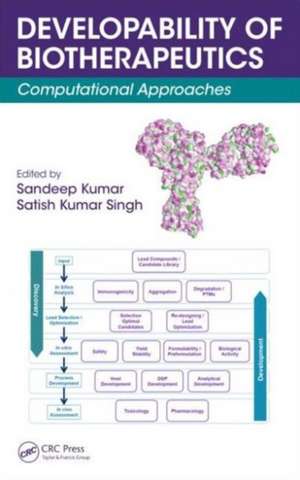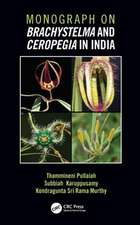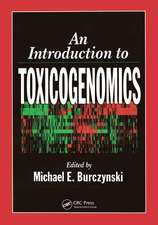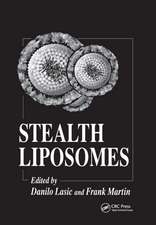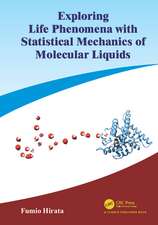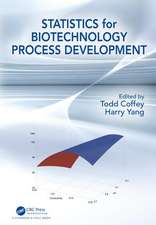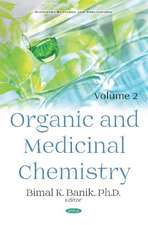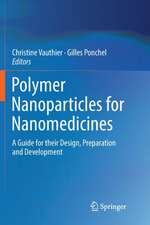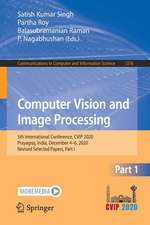Developability of Biotherapeutics: Computational Approaches
Editat de Sandeep Kumar, Satish Kumar Singhen Limba Engleză Hardback – 14 dec 2015
The concept of developability involves making rational choices at the pre-clinical stages of biopharmaceutical drug development that could positively impact clinical outcomes. The book also addresses a general lack of awareness of the many different contributions that computation can make to biopharmaceutical drug development.
This informative and practical reference is a valuable resource for professionals engaged in industrial research and development, scientists working with regulatory agencies, and pharmacy, medicine, and life science students and educators. It focuses primarily on the developability of monoclonal antibody candidates, but the principles described can also be extended to other modalities such as recombinant proteins, fusion proteins, antibody drug conjugates and vaccines.
The book is organized into two sections. The first discusses principles and applications of computational approaches toward discovering and developing biopharmaceutical drugs. The second presents best practices in developability assessments of early-stage biopharmaceutical drug candidates.
In addition to raising awareness of the promise of computational research, this book also discusses solutions required to improve the success rate of translating biologic drug candidates into products available in the clinic. As such, it is a rich source of information on current principles and practices as well as a starting point for finding innovative applications of computation towards biopharmaceutical drug development.
Preț: 1119.45 lei
Preț vechi: 1365.18 lei
-18% Nou
Puncte Express: 1679
Preț estimativ în valută:
214.20€ • 223.66$ • 176.88£
214.20€ • 223.66$ • 176.88£
Carte tipărită la comandă
Livrare economică 15-29 aprilie
Preluare comenzi: 021 569.72.76
Specificații
ISBN-13: 9781482246131
ISBN-10: 1482246139
Pagini: 316
Ilustrații: 78
Dimensiuni: 156 x 234 x 23 mm
Greutate: 0.75 kg
Ediția:1
Editura: CRC Press
Colecția CRC Press
Locul publicării:Boca Raton, United States
ISBN-10: 1482246139
Pagini: 316
Ilustrații: 78
Dimensiuni: 156 x 234 x 23 mm
Greutate: 0.75 kg
Ediția:1
Editura: CRC Press
Colecția CRC Press
Locul publicării:Boca Raton, United States
Cuprins
PRINCIPLES OF BIOPHARMACEUTICAL INFORMATICS. Biopharmaceutical Informatics: Applications of Computation in Biologic Drug Development. Computational Methods in the Optimization of Biologic Modalities. Understanding, Predicting, and Mitigating the Impact of Posttranslational Physiochemical Modifications, Including Aggregation, on the Stability of Biopharmaceutical Drug Products. Preclinical Immunogenicity Risk Assessment of Biotherapeutics. Application of Mechanistic Pharmacokinetic–Pharmacodynamic Modeling toward the Development of Biologics. Challenges in High-Concentration Biopharmaceutical Drug Delivery: A Modeling Perspective. DEVELOPABILITY PRACTICES IN THE BIOPHARMACEUTICAL INDUSTRY. Best Practices in Assessment of Developability of Biopharmaceutical Candidates. Best Practices in Developability Assessments of Therapeutic Protein Candidates in the Biopharmaceutical Industry. Best Practices in Assessing the Developability of Biopharmaceutical Candidates. Developability Assessment Workflows to De-Risk Biopharmaceutical Development.
Notă biografică
Sandeep Kumar, PhD, is a senior principal scientist at Pfizer, Inc. in the Biotherapeutics Pharmaceutical Sciences group, working on computational modeling and developability risk assessments of a wide variety of biotherapeutic drug candidates, including monoclonal antibodies, antibody-based therapeutics, fusion proteins, vaccines, and antibody–drug conjugates. He earned his PhD in computational biophysics from the Molecular Biophysics Unit of the Indian Institute of Science, Bangalore, India, and performed postdoctoral research on proteins at the National Cancer Institute in Frederick, Maryland, a part of the National Institutes of Health. He has been an assistant professor (research-track) at Georgetown University Medical Center, Washington, DC; an assistant professor at the Indian Institute of Technology, Kanpur; and an associate research scientist at Johns Hopkins University, Baltimore, Maryland. He has more than 17 years of experience in computational protein sciences. He has contributed more than 60 research papers, review articles, and book chapters, has delivered more than 40 invited talks, and has chaired sessions of several conferences. He has won several fellowships and awards, including a Fogarty visiting scientist fellowship at NIH and the 2014 Ebert Prize from the American Pharmacists Association. He has also mentored several graduate students and postdoctoral scientists.
Satish Kumar Singh, PhD, is a research fellow at Pfizer, Inc. in the Biotherapeutics Pharmaceutical Sciences group, and an adjunct professor of the Department of Physical Pharmaceutical Chemistry at Uppsala University in Sweden. His responsibilities include leading formulation, product, and process development activities for biologics and therapeutic vaccines. He earned his PhD in chemical engineering from Kansas State University. He has more than 25 years of industrial experience and has published more than 50 peer-reviewed articles with emphasis on the colloidal and physical chemistry of macromolecules. He also holds four patents. He is involved in several professional groups through the American Association of Pharmaceutical Scientists and the USP, was chair of the Protein Aggregation and Immunogenicity Focus group, and is a frequently invited speaker at various conferences and symposia.
Satish Kumar Singh, PhD, is a research fellow at Pfizer, Inc. in the Biotherapeutics Pharmaceutical Sciences group, and an adjunct professor of the Department of Physical Pharmaceutical Chemistry at Uppsala University in Sweden. His responsibilities include leading formulation, product, and process development activities for biologics and therapeutic vaccines. He earned his PhD in chemical engineering from Kansas State University. He has more than 25 years of industrial experience and has published more than 50 peer-reviewed articles with emphasis on the colloidal and physical chemistry of macromolecules. He also holds four patents. He is involved in several professional groups through the American Association of Pharmaceutical Scientists and the USP, was chair of the Protein Aggregation and Immunogenicity Focus group, and is a frequently invited speaker at various conferences and symposia.
Recenzii
‘Developability of Biotherapeutics: Computational Approaches presents the most extensive and systematic overview to date, of modern computational approaches that are being used industrially to assess potential manufacturability and overall ease of development of biotherapeutics such as monoclonal antibodies. The book covers a wide array of topics, spanning from immunogenicity and pharmacokinetic/dynamic properties to key chemical and physical stability attributes. It is recommended as important reading for researchers from both academic and industrial perspectives, and will be of particular interest for graduate students seeking to gain an experienced perspective of the current state of the art and opportunities for high impact research in the future’.
– Christopher J. Roberts, Professor of Chemical & Biomolecular Engineering, University of Delaware.
'Developability of Biotherapeutics: computational approaches presents a state-of-the art and modern overview on computational approaches for evaluating developability of biotherapeutics. Optimal molecule design and selection is a yet underappreciated and underutilized element of finding, developing, and finally commercializing the best molecule. The optimum molecule not only serves patient needs by ensuring efficacy and safety, but is also optimized from a technical drug product development perspective. This book is a must-read for industrial and academic researchers involved in discovering, identifying and optimizing molecules and transitioning from research to development and beyond.'
– Prof. Dr. Hanns-Christian Mahler, Head of Drug Product Services, Lonza AG.
‘This book represents a compelling opening salvo to the field of computational methods applied to antibody developability. The chapters are… supported by extensive and timely literature citations: the average number of citations per chapter goes above 90, with over 50% of the references dating to 2009 or later. Developability of Biotherapeutics: Computational Approaches should be a good addition to the libraries of industrial and academic groups engaged in, or supporting, development of biopharmaceutical drugs.’
– Charlotte M. Deane & Maximiliano Vásquez (2016), mAbs, DOI: 10.1080/19420862.2016.1256723.
– Christopher J. Roberts, Professor of Chemical & Biomolecular Engineering, University of Delaware.
'Developability of Biotherapeutics: computational approaches presents a state-of-the art and modern overview on computational approaches for evaluating developability of biotherapeutics. Optimal molecule design and selection is a yet underappreciated and underutilized element of finding, developing, and finally commercializing the best molecule. The optimum molecule not only serves patient needs by ensuring efficacy and safety, but is also optimized from a technical drug product development perspective. This book is a must-read for industrial and academic researchers involved in discovering, identifying and optimizing molecules and transitioning from research to development and beyond.'
– Prof. Dr. Hanns-Christian Mahler, Head of Drug Product Services, Lonza AG.
‘This book represents a compelling opening salvo to the field of computational methods applied to antibody developability. The chapters are… supported by extensive and timely literature citations: the average number of citations per chapter goes above 90, with over 50% of the references dating to 2009 or later. Developability of Biotherapeutics: Computational Approaches should be a good addition to the libraries of industrial and academic groups engaged in, or supporting, development of biopharmaceutical drugs.’
– Charlotte M. Deane & Maximiliano Vásquez (2016), mAbs, DOI: 10.1080/19420862.2016.1256723.
Descriere
This reference describes applications of computational and molecular modeling techniques toward more efficient and affordable biopharmaceutical drug development at the pre-clinical stages that could positively impact clinical outcomes. With a primary focus on the developability of monoclonal antibody candidates, it addresses many contributions that computation can make towards biopharmaceutical drug development in general. It is a rich source of information on current principles and practices and provides a starting point for finding innovative applications of computation in biotherapeutics.
